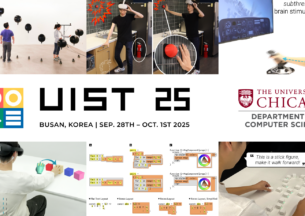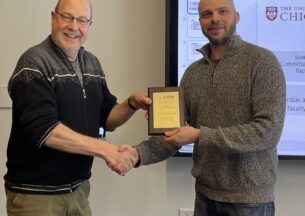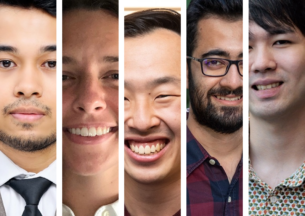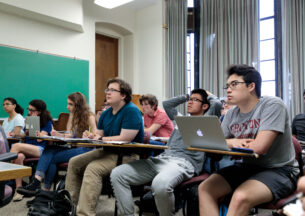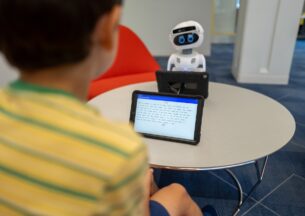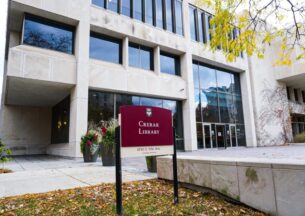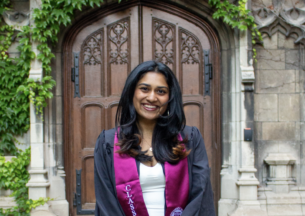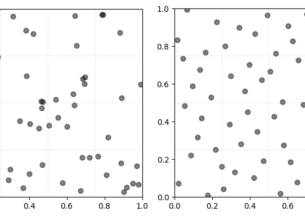Four Students Receive Honorable Mention in CRA Undergraduate Research Awards
Four University of Chicago Computer Science undergraduate students — Jacob Serfaty, Jack (Zihan) Zhang, Yiming Su, and Cyrus (Zikai) Zhou — have received honorable mentions at the Computing Research Association (CRA) Outstanding Undergraduate Researcher Award. Sponsored by the Mitsubishi Electric Research Labs, this award recognizes undergraduate students in North American colleges and universities who show outstanding research potential in an area of computing research. The student must prepare a resume, a research summary, a personal statement, and their transcript, along with a letter of recommendation from the P.I. to be considered for nomination by the school.
Yiming Su
Advised by Shan Lu
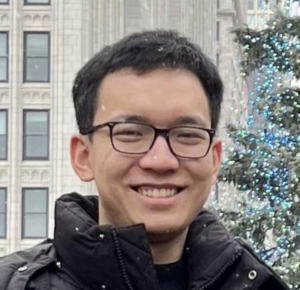 Yiming Su is a fourth-year Computer Science major at UChicago. His research interests are focused broadly on systems reliability, which includes investigating software systems to make them more reliable and dependable. Under the guidance of Professor Shan Lu, Su investigates reliability issues in distributed applications through analyzing and finding bugs.
Yiming Su is a fourth-year Computer Science major at UChicago. His research interests are focused broadly on systems reliability, which includes investigating software systems to make them more reliable and dependable. Under the guidance of Professor Shan Lu, Su investigates reliability issues in distributed applications through analyzing and finding bugs.
Throughout his undergraduate career, Su has studied large software systems reliability and investigated issues such as concurrency issues in software. Thus far, he has already published a paper as first author, titled HotGPT: How to Make Software Documentation More Useful with a Large Language Model? Su proposes new qualitative and quantitative methods to scientifically evaluate the performance of a Large Language Model (LLM), and also provides some insights into how to responsibly and reliably incorporate LLM in production workflows. He does this through investigating a one-model-fit-all solution through LLMs such as the GPT series, covering three representative tasks: extracting locking rules from comments, synthesizing exception predicates from comments, and identifying performance-related configurations.
Su’s research has real-world applications as LLMs are increasingly embedded in many programs today. Su says, “I hope that our paper has shed some light on how to use these powerful models reliably.”
Jacob Serfaty
Advised by Pedro Lopes
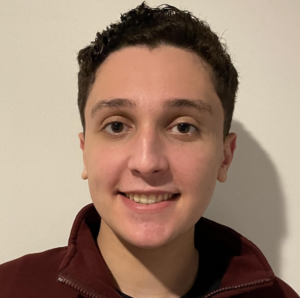 Jacob Serfaty is a third-year Computer Science and Math double major at UChicago. His research interests involve bringing new senses to Virtual Reality (VR), and he is a part of the Human-Computer Integration Lab (HCI Lab) run by Associate Professor Pedro Lopes.
Jacob Serfaty is a third-year Computer Science and Math double major at UChicago. His research interests involve bringing new senses to Virtual Reality (VR), and he is a part of the Human-Computer Integration Lab (HCI Lab) run by Associate Professor Pedro Lopes.
When asked about his interests, Serfaty stated, “I’ve been interested in this field from when I was a child, as I was always fascinated by technologies that integrate people and computers such as Google Glass. I was drawn to VR development specifically from my experience with game design/development.”
This led him to join the UChicago Game Design Club and the STAGE Lab’s quantum gaming initiative, both of which showed him how to merge his passion for programming simulations and designing for specific user experiences through VR development. He was offered a research position at the HCI Lab, where he used his acquired game design/development knowledge to make VR simulations to showcase haptic devices. Under Professor Lopes’ guidance, Serfaty worked on three projects: JumpMod Haptic Backpack, Stick&Slip, and Haptics Source-effector. All three integrate full-body haptics to create new types of sensations in VR/AR, such as friction, acceleration, and different forces. For example, the JumpMod Haptic Backpack, which is a backpack that can move weights at high speeds up and down to alter users’ perceptions of gravity. This creates the sensation of either jumping high, falling very quickly, and more. JumpMod was published at CHI ‘23 and both Stick&Slip and Haptics Source-effector will be presented at CHI ‘24 in Hawaii.
Lopes, who advises Serfaty, expressed great pride when discussing Serfaty’s accomplishments. “This is the most prestigious publication venue in Human-Computer Interaction and it is fairly unusual for undergraduates to be authoring two papers at this high level,” he emphasized.
Jack (Zihan) Zhang
Advised by Rana Hanocka
 Jack Zhang is a fourth-year student studying both Computer Science and Math at UChicago. He is passionate about applying deep learning methods and differential geometry and algebraic topology in computer graphics problems, which combines both of his disciplines. Because many computer graphics research topics intersected with geometry, deep learning, and also came with creative and artistic freedom of choice, Zhang became interested in the topic.
Jack Zhang is a fourth-year student studying both Computer Science and Math at UChicago. He is passionate about applying deep learning methods and differential geometry and algebraic topology in computer graphics problems, which combines both of his disciplines. Because many computer graphics research topics intersected with geometry, deep learning, and also came with creative and artistic freedom of choice, Zhang became interested in the topic.
“I discovered this area purely by accident,” Zhang said. “While I was searching for study materials on differential forms in my third quarter analysis class during my first year, I stumbled on this set of videos that focus on discrete differential geometry with a focus on meshes, a popular surface representation of computer graphics.”
He is currently advised by Assistant Professor Rana Hanocka and a part of the 3DL Lab, focusing on motion synthesis with generative models. His paper on this topic, titled GANimator: Neural Motion Synthesis from a Single Sequence, was presented at SIGGRAPH ‘22 and utilized multiscale neural networks to generate diverse motions given a single input sequence. He also worked on a project that develops a new way of applying diffusion models to motion synthesis, of which the paper is under review. Currently, he is working on topology control for surface reconstruction with persistent homology.
“Jack has excellent and already-demonstrated research potential,” Hanocka, who advises Zhang, emphasized. “He has already published in the most prestigious venue in computer graphics (SIGGRAPH), which is a highly coveted achievement often missed even by exceptional PhD students.”
Zhang believes that these tools could ideally be integrated into existing software or pipelines for artists working in the animation or graphics domain. After graduating from UChicago, he is looking forward to beginning his Ph.D. in Computer Science at the University of Washington.
Cyrus (Zikai) Zhou
Advised by Yanjing Li
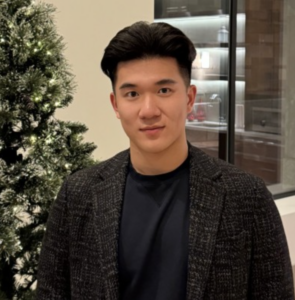 Cyrus Zhou is a fourth-year Computer Science major at UChicago. He is passionate about hardware and software co-design for emerging workloads, especially in the field of machine learning. The goal of his interest is to improve the performance of such co-designs and look out for implications in reliability and security.
Cyrus Zhou is a fourth-year Computer Science major at UChicago. He is passionate about hardware and software co-design for emerging workloads, especially in the field of machine learning. The goal of his interest is to improve the performance of such co-designs and look out for implications in reliability and security.
He developed this interest by first joining Professor Shan Lu and Associate Professor Blase Ur’s lab, which eventually led to his work in Assistant Professor Yanjing Li’s group in his third year. Zhou says, “I was amazed by how carefully designed abstractions, components, and tools in computer systems can lead to huge gains in efficiency, reliability, and programmability.”
Zhou has worked on various projects. Alongside Assistant Professor Yanjing Li, he led two projects on improving the efficiency and robustness of machine learning through co-optimizing circuits, computer architecture, compiler-level software, and algorithms. He has also previously worked with Professor Shan Lu on projects that enhanced software reliability by understanding and fixing bugs in computer systems and with Associate Professor Blase Ur on user-centered security and privacy projects. Zhou expresses his gratitude for the professors, co-authors, and CS staff who supported him in his computer science research journey and for the lifelong connections that were formed outside of the laboratory.
Zhou is excited about the potential of novel computing systems and tools to achieve better efficiency, reliability, and usability of computing infrastructure. Next year, he is looking forward to staying in the United States and beginning his Ph.D. in a related field.
Congratulations to Jacob Serfaty, Jack (Zihan) Zhang, Yiming Su, and Cyrus (Zikai) Zhou for their hard work and for their honorable mentions!


